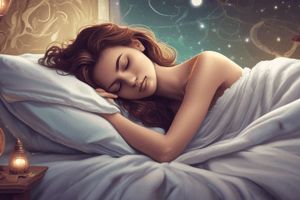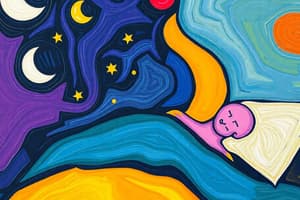Podcast
Questions and Answers
Which of the following strategies can help improve sleep quality?
Which of the following strategies can help improve sleep quality?
- Consuming high doses of caffeine in the evening
- Maintaining an irregular sleep-wake schedule
- Limiting electronic screen exposure before sleep (correct)
- Exercising intensely right before bedtime
What is the primary function of the circadian rhythm?
What is the primary function of the circadian rhythm?
- To influence emotional responses
- To manage physical stress levels
- To regulate sleep-wake cycles (correct)
- https://knowt.com/note/4fbb9f3b-7445-41e3-be64-7738383af33b/Untitled?isNew=true
How does lack of sleep affect cognitive function?
How does lack of sleep affect cognitive function?
- It enhances decision-making abilities
- It negatively impacts attention and concentration (correct)
- It improves memory recall
- It has no impact on attention
Which statement about sleep and mental health is true?
Which statement about sleep and mental health is true?
Which of the following actions might disrupt the circadian rhythm?
Which of the following actions might disrupt the circadian rhythm?
What is the primary characteristic of N1 sleep?
What is the primary characteristic of N1 sleep?
Which sleep stage is responsible for physical restoration and cognitive function?
Which sleep stage is responsible for physical restoration and cognitive function?
How much sleep do adults typically require for optimal health?
How much sleep do adults typically require for optimal health?
What common sleep disorder is characterized by difficulty falling or staying asleep?
What common sleep disorder is characterized by difficulty falling or staying asleep?
What can significantly influence an individual's sleep needs aside from chronological age?
What can significantly influence an individual's sleep needs aside from chronological age?
During which sleep stage does muscle paralysis commonly occur?
During which sleep stage does muscle paralysis commonly occur?
Which of the following is NOT a good practice for maintaining sleep hygiene?
Which of the following is NOT a good practice for maintaining sleep hygiene?
What is a common result of sleep deprivation?
What is a common result of sleep deprivation?
Flashcards
Circadian Rhythm
Circadian Rhythm
The human body's internal clock which controls sleep-wake cycles and runs on a 24-hour cycle.
Light and Sleep
Light and Sleep
Exposure to light before bed can disrupt your circadian rhythm, making it harder to fall asleep.
Sleep and Memory
Sleep and Memory
Sleep is essential for processing information learned during the day, making memories stronger and easier to recall.
Sleep Deprivation and Cognition
Sleep Deprivation and Cognition
Signup and view all the flashcards
Sleep and Mental Health
Sleep and Mental Health
Signup and view all the flashcards
N1 Sleep
N1 Sleep
Signup and view all the flashcards
N2 Sleep
N2 Sleep
Signup and view all the flashcards
N3 Sleep (Slow-Wave Sleep)
N3 Sleep (Slow-Wave Sleep)
Signup and view all the flashcards
REM Sleep
REM Sleep
Signup and view all the flashcards
Sleep Duration
Sleep Duration
Signup and view all the flashcards
Sleep Disorders
Sleep Disorders
Signup and view all the flashcards
Sleep Hygiene
Sleep Hygiene
Signup and view all the flashcards
Sleep Deprivation
Sleep Deprivation
Signup and view all the flashcards
Study Notes
Sleep Stages
- Sleep is divided into distinct stages characterized by different brainwave patterns and physiological changes.
- The stages are cyclical, repeating several times per night.
- Stages include REM (rapid eye movement) sleep and NREM (non-rapid eye movement) sleep. Further, NREM sleep is divided into three sub-stages (N1, N2, and N3).
- N1 sleep is the transition between wakefulness and sleep, featuring slow eye movements and easy awakenings.
- N2 sleep is a light sleep stage, comprising roughly half of total sleep time. Further slowing of brainwave activity occurs, alongside sleep spindles and K-complexes (brief bursts of electrical activity).
- N3 (slow-wave) sleep is a deep sleep stage, marked by slow delta waves. It's crucial for physical restoration and cognitive function.
- REM sleep involves rapid eye movements, vivid dreams, and often more active brainwave patterns similar to wakefulness. Muscle paralysis typically occurs during REM sleep to prevent acting out dreams.
Sleep Duration and Needs
- Adults typically need 7-9 hours of sleep per night for optimal health and function.
- Sleep needs vary by individual and change throughout life, with infants and young children needing far more sleep than adults.
- Insufficient sleep negatively impacts cognitive function, mood, and overall well-being, potentially contributing to various health issues.
- While chronological age matters, other factors, such as stress, diet, and health conditions, also influence sleep needs.
- Well-rested individuals usually report increased productivity.
Sleep Disorders
- Sleep disorders affect sleep quality and duration, impacting overall health.
- Common sleep disorders include insomnia (difficulty falling or staying asleep), sleep apnea (breathing pauses during sleep), narcolepsy (uncontrollable sleep attacks), and restless legs syndrome (unpleasant leg sensations requiring movement).
- These disorders affect various aspects of daily life, requiring early diagnosis and treatment for improved quality of life.
Sleep Hygiene
- Good sleep hygiene improves sleep quality and quantity.
- Key aspects involve a regular sleep schedule, a relaxing bedtime routine, and an optimized sleep environment (dark, quiet, cool bedroom).
- Limiting light and electronic screen time before bed promotes better sleep.
- Avoiding caffeine and alcohol before bedtime also aids sleep quality.
- Regular exercise is beneficial but avoiding it close to bedtime is recommended.
Biological Rhythms
- The circadian rhythm, the body's internal 24-hour clock, regulates sleep-wake cycles.
- This internal clock is influenced by external factors, like light exposure.
- Disruptions to the circadian rhythm (e.g., jet lag, shift work) disrupt sleep patterns, causing fatigue and health problems.
- Maintaining a regular sleep-wake schedule helps regulate this internal clock.
Cognitive Function and Sleep
- Sleep is essential for memory consolidation, learning, and cognitive performance.
- During sleep, the brain processes and consolidates information from the day, improving memory recall.
- Insufficient sleep impairs attention, concentration, and decision-making abilities.
- Sleep is vital for cognitive functioning.
Sleep and Mental Health
- Sleep quality and mental health are closely linked.
- Individuals facing chronic stress, anxiety, or depression often experience sleep disturbances.
- Quality sleep is crucial for mental well-being.
- Conversely, sleep disturbances can worsen anxiety, depression, and other mood disorders.
- Persistent sleep problems warrant professional help to address underlying mental health conditions.
Studying That Suits You
Use AI to generate personalized quizzes and flashcards to suit your learning preferences.




